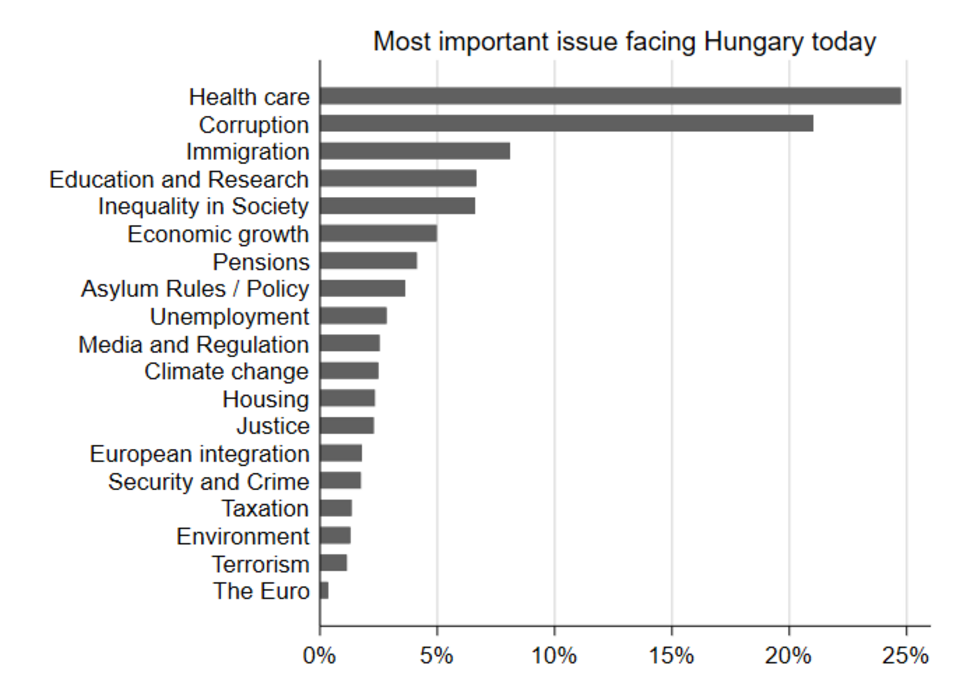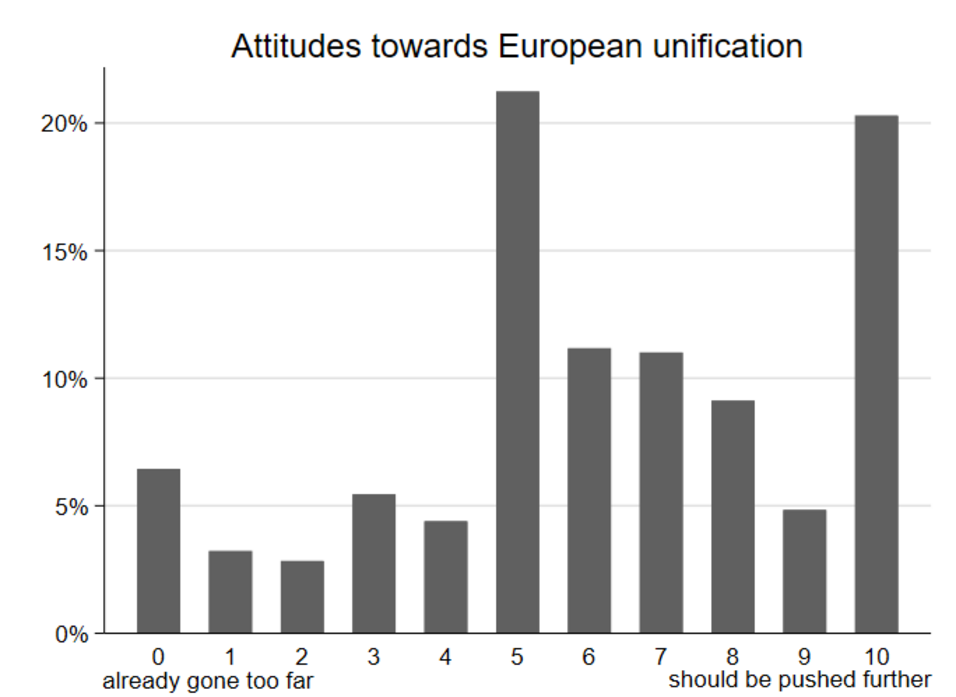by Susánszky Pál and James Wilhelm
A Fidesz-Dominated Campaign
In 2018, the right-wing ruling party Fidesz won the Hungarian general election for the third time in a row by a two-thirds majority. According to public opinion surveys conducted this year, Fidesz still undoubtedly enjoys huge support amongst Hungarian citizens. Moreover, opposition parties have not found a way to coordinate their politics, strategies or main messages in a way that cuts through to voters – it seems that they are rather focusing on the local elections in October and not on the European election.
The government and Fidesz have so far dominated the European election campaign with their anti-refugee, zero-immigration message, and have also (re)introduced a billboard campaign against European elites, Brussels and Jean-Claude Juncker specifically. During the last weeks of the campaign, the most important issue has been Fidesz’ position and membership in the European People’s Party (EPP). In late March, the EPP suspended the membership of Fidesz, which indicates the party’s distancing from the mainstream European right. This decision has harsh consequences, as "Fidesz will no longer be present at any party meeting, nor have speaking time, nor voting rights, nor the right to propose candidates for posts." [1] Since the suspension, the conflict between the Hungarian Prime Minister and EPP has not shown signs of abating: as a reaction, Viktor Orbán announced that Fidesz would not support EPP’s lead candidate, Manfred Weber. Moreover, Orbán met with the Italian right-wing populist Matteo Salvini in Budapest, signaling the emergence of a new, far-right populist alliance.
The Important Issues at the Voter Level
Figure 1 displays the most important issues facing Hungary today, according to the 2,012 eligible voters in Hungary we surveyed prior to the start of the election campaign (interviewed between April 3 and April 22, 2019).[2] Though the issues of immigration (8%) and asylum rules and policies (4%) have received much recent international attention in relation to Hungary, for potential Hungarian voters in the upcoming European Parliament election, the issues of health care (25%) and corruption (21%) appear to be dominant (even when immigration and asylum rules and policies are collapsed into a single category). While health care has obvious roots in Hungarian domestic politics, it is likely that the concern with corruption is also domestic in nature: according to our unweighted data, 62% of the Hungarian citizens we surveyed express some level of dissatisfaction with how democracy works in Hungary, with 32% of these indicating that they are “not at all satisfied”. By contrast, only 22% of the respondents express satisfaction with democracy in Hungary.[3] Meanwhile, in relation to how democracy works in the European Union, 44% of the respondents express satisfaction versus 35% who express dissatisfaction.[4] Thus, it appears that before the European election campaign began, voters were more preoccupied with issues that are domestic rather than European in nature. However, this is not to rule out that the issues of immigration and asylum, which are inherently transnational in nature, have become more salient as the campaign has progressed, reflecting the key themes of the campaign at the media and party level. Our survey will test whether this is the case – also in terms of themes touched upon in political discussion amongst citizens – in our post-election survey with the same respondents.
An Emerging Pro-EU Consensus amongst Citizens?
Figure 2 displays where our sample of Hungarian respondents placed themselves on a 0-10 point European unification scale, where 0 indicates that European unification has already gone too far, and 10 that it should be pushed further.[5] The potential Hungarian voters we surveyed display a generally positive disposition towards European unification, with 56% indicating that it should be pushed further, and 20% placing themselves at the farthest end of the scale, demonstrating very strong support for unification. Only 20% indicate that, to some extent, European unification has gone too far. Compared with post-election data collected by the European Election Study project in 2014, this indicates an increase in support for European unification amongst Hungarians: in the study, which employed the same question, more respondents indicated that European unification had already gone too far (43%) than that it should be pushed further (36%). While this may seem to be good news for the European Union, it remains to be seen whether this positive outlook towards European unification will hold until Election Day. Reinterviewing the same respondents in a post-election wave, our survey will shed light on the stability of Hungarian public opinion in this regard.
Possible last-minute mobilisation
Newly emerging campaign issues are not expected in the final week of the campaign. However, parties are likely to make efforts to mobilise their sympathisers and the electorate. Based on the results of last year’s general election, anti-immigration campaign messages seem to resonate more strongly with Hungarian citizens than those claimed by liberal and left-wing opposition parties. Improving education and healthcare are important issues for the people of Hungary – but it remains to be seen whether these will be appealing enough to attract more votes for opposition parties.
Footnotes
[1] www.epp.eu/press-releases/fidesz-membership-suspended-after-epp-political-assembly/
[2] Question in English: “Now a question about the issues facing Hungary today. Among the following,
which do you think is the most important one? Please select one.” (Respondents presented the items listed in Figure 1). Question in Hungarian: “Most a politikával és a közügyekkel kapcsolatos pár kérdés következik. Az alábbi témakörök közül Melyikről beszélgetett legtöbbször az elmúlt hónapban?”
[3] Question in English: “On the whole, how satisfied are you with the way democracy works in Hungary, where 0 means “not at all satisfied” and 10 means “completely satisfied”?” Respondents placing themselves from 0-4 on the scale are counted as expressing dissatisfaction, and from 6-10 as expressing satisfaction. Question in Hungarian: “Összességében mennyire elégedett a demokrácia működésével Magyarországon, ha a 0 az „Egyáltalán nem vagyok elégedett”, míg a 10 a „Teljesen elégedett vagyok” állítást jelöli?”
[4] Question in English: “And how satisfied are you with the way democracy works in the European Union?” Responses to this question are counted as per footnote 6. Question in Hungarian: “Mennyire elégedett a demokrácia működésével az Európai Unióban?”
[5] Question in English: “Some say European unification should be pushed further. Others say it already has gone too far. What is your opinion? Please indicate your views using a scale from 0 to 10, where ‘0’ means unification “has already gone too far” and ’10’ means it “should be pushed further””. Question in Hungarian: “Vannak, akik azt mondják, hogy az európai egyesítés érdekében további lépéseket kellene tenni. Mások szerint viszont az egyesülés már így is el van túlozva. Önnek mi erről a véleménye? Kérem, jelölje nézeteit egy 0‐tól 10‐ig terjedő skálán, amelyen a ‘0’ jelentse azt, hogy az egyesítés „már így is eltúlozta”, a ’10’ pedig azt, hogy “tovább kellene vinni”.”
This blog post has also appeared in the RECONNECT blog.
Susánszky Pál works as a research assistant at the Institute for Political Science at the Hungarian Academy of Sciences. Dr. James Wilhelm (postdoc) is a specialist in the areas of public opinion, political psychology, voting behaviour, European studies, survey design and analysis, and experimental methods.




